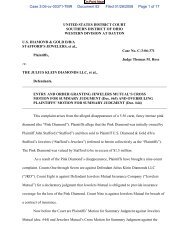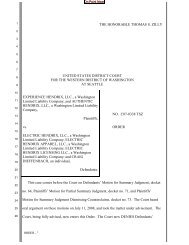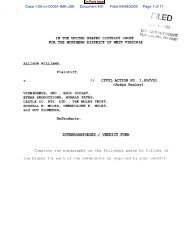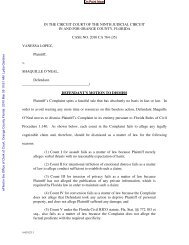GORDON KEENE VELLA. - On Point News
GORDON KEENE VELLA. - On Point News
GORDON KEENE VELLA. - On Point News
Create successful ePaper yourself
Turn your PDF publications into a flip-book with our unique Google optimized e-Paper software.
Melchert and Parker study as one of the 87 studies in which the authors found “complete<br />
forgetting” when the study actually contradicts that theory. (Pope Decl. 16.)<br />
Another study cited by Dr. Brown as supportive of dissociative amnesia, the Epstein and<br />
Bottoms study, repeatedly questions the legitimacy of the theory, rather than offering support for<br />
it. As Dr. Pope explains, Epstein and Bottoms opined that “some victims who report temporary<br />
forgetting might have always remembered an event but thought about it differently during certain<br />
periods of their lives . . . .” (Pope Decl. 17) (emphasis added.) Additionally, Epstein and<br />
Bottoms noted that some respondents may have “forgotten” their abuse because they chose not to<br />
think about it and not because the memories were actually unavailable. (Pope Decl. 18.)<br />
The Epstein and Bottoms study is especially significant here because it confronted headon<br />
Dr. Brown’s theory that repressed memories are “inaccessible” so as to constitute a basis for<br />
tolling a limitations period. The authors of that study concluded that the temporary forgetting<br />
reported by their test subjects would “not meet the [legal] standard set by the more common<br />
delayed discovery doctrine adopted by many states to accommodate repressed memories of<br />
abuse, wherein victims seek redress after normal statutes of limitations have lapsed must prove<br />
that they had no memory (classic repression) of the sexual abuse until filing suit (Brown et al.,<br />
1998).” (Pope Decl. 19.) Significantly, the “Brown et al., 1998” cited by Epstein and<br />
Bottoms is the very same Daniel Brown who testified at trial in this matter. (Id. 20.)<br />
Thus, the Epstein and Bottoms study repeatedly questions whether true amnesia has<br />
occurred in any of the test subjects and explicitly concludes that the reports of forgetting would<br />
not meet Dr. Brown’s own definition of repressed memories sufficient to toll a statute of<br />
limitations, specifically calling out Dr. Brown by name, and contradicts Dr. Brown’s hypothesis<br />
- 16 -
















